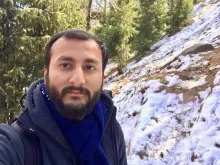MS IT Spring '22

Concentration: Data Science and Analytics
Tell us a bit about yourself and your IT background.
I come from a very diverse background and until now my experience has been varied comprising of both the technical and business aspects of the real world. I graduated with a dual degree integrated course (5 Years) from NMIMS University, Mumbai, India with a Bachelor’s in Electronics and Telecommunications and MBA in Finance. This course gave me a comprehensive sense of the real world with knowledge and a holistic understanding of how technology and business are amalgamated. Before coming to RPI, I worked for PricewaterhouseCoopers as a Management Consultant/ Associate and gained a good amount of business consulting experience. Most of my projects were related to digital transformation and involved handling huge amounts of data, which further motivated me to enrich my technical knowledge especially in the field of IT and Data Science. Thus I decided to join Rensselaer Polytechnic Institute in its prestigious ITWS program.
Why did you choose to attend the ITWS program at RPI?
The ITWS program is a well reputed program with great experienced faculty. I specifically chose this program because of the flexible coursework. When I first went through the course catalogue, I found many courses which interests me and several concentrations to choose from. Since I had prior industry experience I was looking for a strong but concise course plan which could help me boost up my technical skills.
What kinds of research projects have you undertaken at RPI?
I worked mainly 2 projects as part of my final class projects in the Data Analytics and X-Informatics course. In my Data Analytics class I worked to determine the Vulnerability Index of Health Care Facilities in the US using Python and Machine Learning (Ongoing). We leveraged NASA’s Global Precipitation Measurement (GPM) Program and Homeland Security Foundation-Level Infrastructure data to determine facilities which are most vulnerable in cases of natural disasters caused by heavy rainfalls. I used clustering models to detect most vulnerable locations based on precipitation and ranked them using a custom but simple algorithm. In another project, I worked in a team to determine the Effect of Dependent Factors on Global Child Mortality. We tried to predict trends in child mortality rates and reports on progress towards the health-related Sustainable Development Goals (SDGs) and associated targets.
Tell us about being a TA in the ITWS program.
I have been a Teaching Assistant to Professor Thilanka Munasinghe for 2 semesters. This has been a very special and an altogether different experience for me. The best part of this experience was solving doubts and queries of students. I will term this as a sensitive responsibility because over the time I realized how important it is to provide support and hand hold students who need it the most. Being a TA, I had to be well versed with the assignments and announcements that professor makes in the class so I had to be super attentive. While grading, I had to be very fair to maintain the integrity and provide unbiased evaluation & feedback to the students. Overall, being a TA enhanced my interpersonal skills and boosted my confidence.
Tell us about your summer internship.
My summer internship was with IBM Research. Due to the COVID restrictions the internship was completely remote. I was selected to work with the AI Research team of IBM which focused on Data Labeling. The best part of the internship was that I was given an individual project which was both fascinating and strenuous as I had little experience in AI and machine learning. My responsibility was to change the current system from a fixed size partitioning algorithm to a dynamic algorithm which can eventually help speed up the data labeling process for the users. So my job was to perform an extensive research on dynamic clustering algorithms and determine the best possible one. The internship immensely helped me improve my machine learning skills and also made me realize that AI/ML really interests me, hence I took an advanced course in ML the following semester.
What have been some of your favorite classes and class experiences at RPI?
Some of the classes which I really liked are Data Analytics which helped me revise my R concepts, Projects in AI and ML which focused mainly on the deep learning aspects and Statistics for Managerial Decision Making which taught us to use analytical tools like advanced excel, SAS and Tableau for preliminary data analysis.
Tell us about grad student life, from your experience.
I found the program slightly demanding, although I could manage my assignments, projects and presentations quiet efficiently still leaving time for having fun. I made lot of friends from my different courses. I really enjoyed the events organized by the the graduate community every alternate weekends, they are really fun and you get to meet and connect with a lot of new students from different fields.
What advice would you give to prospective graduate students considering the ITWS program at RPI?
RPI’s ITWS program is an excellent program. With this program you can prepare yourselves for a Software Engineering/ Data Engineering role as well as a Data/ Business Analysts profile depending on the coursework you choose. Graduating from this program will definitely open up a lot of job opportunities for you. The university has a lot of student resources for professional development. Even if you have less experience in CS field, I believe this program can help you garner your technical skills and help you excel in your carrier.
